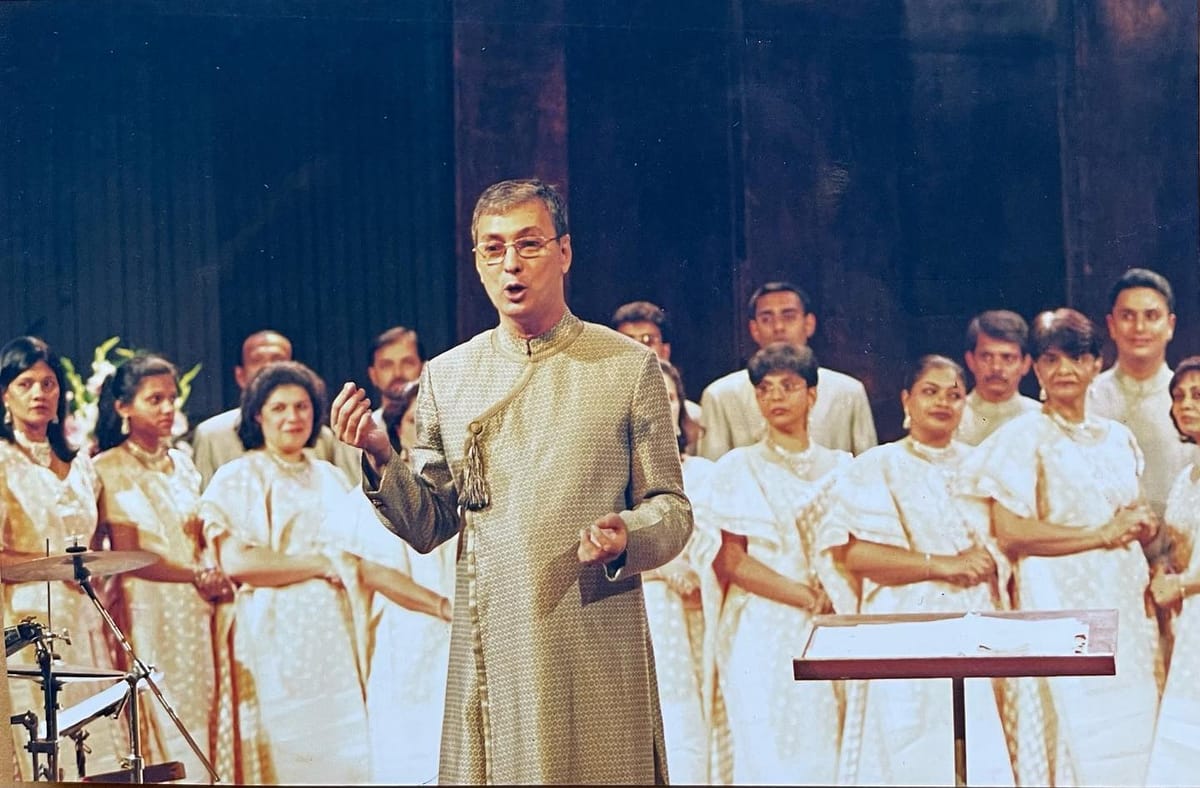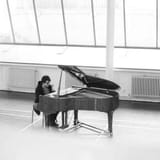Alfred D'Souza, Chairman and Music Director - Stop-Gaps Cultural Academy

Nikhil Sardana: What does the name "Stop-Gaps" stand for?
Alfred D'Souza: The Stop-Gaps initially started as a spontaneous and temporary choral group formed to raise funds for a pressing social need. Our aim was to provide relief to the washermen, or "dhobis," whose homes and livelihoods were destroyed during the devastating flooding of the Adayar River in Chennai around Christmas in 1972. The group comprised individuals of various ages, professions, communities, religions, and social backgrounds, which led to the bridging of several gaps in the process of singing for a common cause. Hence, the name, The Stop-Gaps.
We went carol singing for nearly six consecutive nights across Chennai (then Madras), and the funds collected were used to purchase clothes and food for the affected families, which were distributed on Christmas Day. Today, although the choir remains amateur, we strive for highly professional standards and perform a wide range of musical genres. We are known for our thematic concerts that cater to diverse tastes in our audience. Our motto is: Bridging the World With Song.
NS: Where did you grow up, and when did you move to Bombay? Please share some background about your early life.
AD: I was born in Kalyan, in the Thane district of Maharashtra, but I spent my early childhood in Chennai, where I lived with my mother's family. It was there that my musical and creative talents were nurtured. My grand-aunt’s husband was an organist and choir master, and the choir rehearsals took place at home. My mother and most of her family were singers, so I was surrounded by music and choral singing from a young age.
At the age of four, I performed a broadcast on All India Radio, although at the time I had no idea I had a special talent! I also sang in a boys' choir in Chennai, conducted by the strict yet endearing Father George Whyte, from whom I learned a great deal.
In 1964, I moved to Mumbai due to my father’s transferable job. Before that, he was posted in Bhira, a remote place in those days, where he worked as the resident doctor at a hydroelectric station. I completed my final three years of schooling at St. Mary’s (ISC) in Mumbai, and then returned to Chennai for higher studies. I earned a Bachelor's degree in Zoology and a Master's in Social Work, both from Loyola College. It was during this time that I formed the original Stop-Gaps.
I later returned to Mumbai and began working at the same company where my father had been employed. During this period, I pursued a brief stint in vocal studies under Situ Singh Beuhler and the late Hyacinth Brown. I also attended a masterclass with Metropolitan Opera singers Joanne Grillo and Richard Kness. Impressed with my countertenor voice and versatile singing style, they offered to take me to the U.S., but I declined for personal reasons, a decision I do not regret.
NS: Could you share the history of the Stop-Gaps Cultural Academy, including some key events and achievements?
AD: The Stop-Gaps Choral Ensemble was officially formed in Mumbai in 1984, after I had disbanded the original group in Chennai. That same year, we launched The Festival of Festive Music, a Christmas carol competition at Patkar Hall, which featured around six choirs. This event was organized to raise funds for the English-Speaking Union of the Commonwealth, an organization with which I was involved.
The festival was well-received, and the following year, we expanded it, taking it to the Tata Theatre. We eliminated the competitive aspect to make it more choir-friendly, transforming it into an event dedicated to peace and goodwill. Over time, it grew into a two-day event, and we opened it to choirs from all over India. The Stop-Gaps Cultural Academy became a registered organization in 1985, making it easier to secure sponsorships and funding. We were also accepted as an associate by the Indian Council for Cultural Relations (ICCR).
One of our most prestigious performances was singing at a Papal Audience for the late Saint Pope John Paul II at the Vatican. We have also opened the Indian Film Festival in Stuttgart, and we were the first Indian choir to perform in China. Additionally, we were invited to represent India at the closing celebrations of Israel’s 50th anniversary of independence.
Two key initiatives of the Stop-Gaps Cultural Academy are The Festival of Festive Music, held every December for the past 33 years at the Tata Theatre in Mumbai, and The Young Talent Concert series, which we run in association with the NCPA. Through the Young Talent Concerts, young musicians of Indian origin, between the ages of 15 and 30, who have reached a high level of proficiency in Western classical music, are given a platform to showcase their artistry before a knowledgeable and supportive audience. We recently added The Budding Brigade to this series, which focuses on children aged six to fourteen.
The Stop-Gaps Choral Ensemble has represented India at numerous international choir festivals and competitions, including the prestigious performances I mentioned earlier.
NS: Could you explain the Parish Zonal Competitions and their significance?
AD: The Parish Zonal Competitions are an excellent showcase of talent, and they foster a healthy rivalry among participants. In these competitions, the parish is divided into zones, and residents compete in various disciplines, with singing and dramatics being the most popular. These events not only help individuals hone their skills but also provide a platform for their talents to be recognized. There are shields, cups, and cash prizes to be won, and the judges are all highly respected professionals in their respective fields.
NS: What are you most looking forward to in this year's Young Talent and Budding Brigade Concert series?
AD: This year, I am eagerly anticipating a high level of performance from the young artists. The bar has been set quite high over the years, and I always hope to see it raised further. I am constantly amazed by the level of professionalism and artistry some of these young musicians have achieved, even while they are still students.
I also hope that their performances inspire others to take up music and pursue it with dedication, rather than solely focusing on academic studies. These events serve as a reminder of the immense talent within our youth, and I believe they play a crucial role in encouraging the next generation of musicians.





